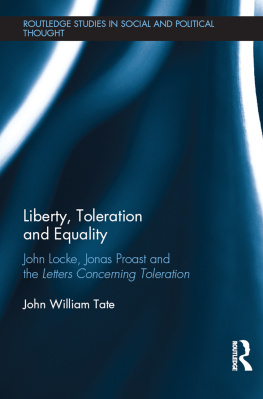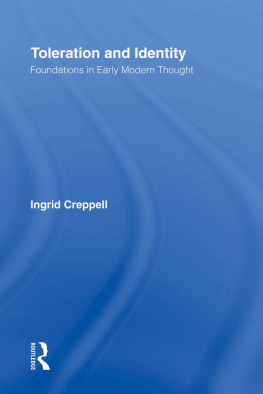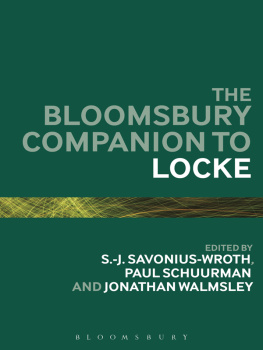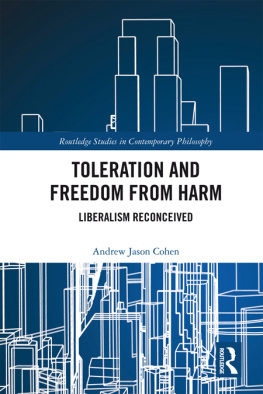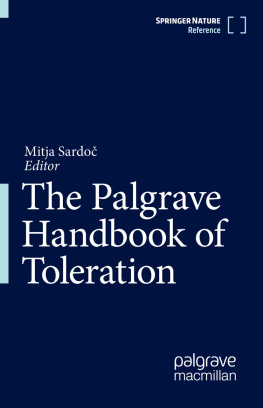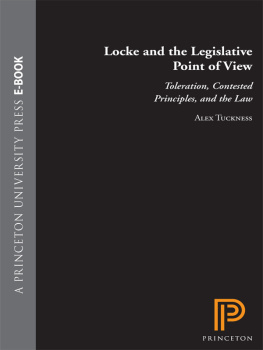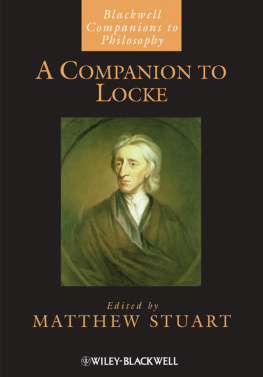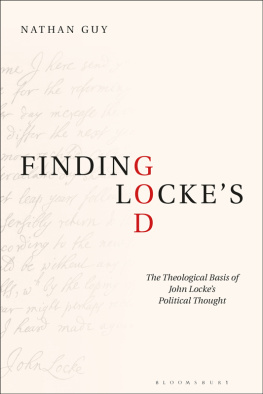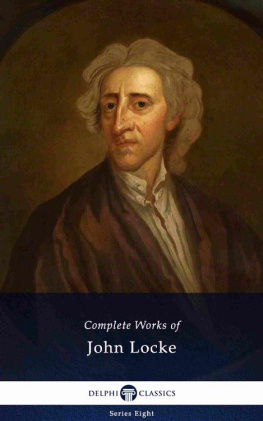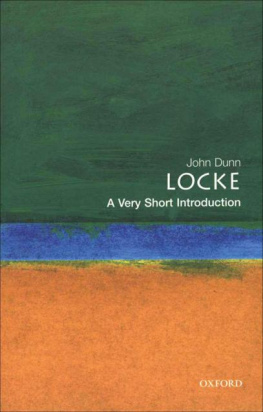Lockes defence of toleration is increasingly recognized as a topic not only of historical interest but also of importance for contemporary political theory, and politics. John Tate has written a book that reflects close understanding of Lockes texts and circumstances and of the sophisticated scholarship that has been devoted to them. This is a thorough and engaging book on a major topic.
Richard Vernon, University of Western Ontario, Canada
In this bold and important new book John Tate seeks to rescue Locke from the claims of the historians of contemporary irrelevance and the charges of illiberalism of some liberal political philosophers. Through a careful and sensitive discussion of the development of his ideas about toleration, and in particular close attention to the protracted debate with Jonas Proast, Tate seeks to re-establish Lockes credentials as a founder of the liberal tradition of continuing relevance to liberal theorising.
John Horton, Professor Emeritus of Political Philosophy, Keele University, UK
Liberty, Toleration and Equality
The seventeenth century English philosopher John Locke is widely recognized as one of the seminal sources of the modern liberal tradition. Liberty, Toleration and Equality examines the development of Lockes ideas on toleration, from their beginnings, to the culmination of this development in Lockes fifteen-year debate with his great antagonist, the Anglican clergyman Jonas Proast. Locke, like Proast, was a sincere Christian but, unlike Proast, Locke was able to develop, over time, a perspective on toleration which allowed him to concede liberty to competing views which he, personally, perceived to be false and absurd. In this respect, Locke sought to affirm what has since become the basic liberal principle that liberty and toleration are most significant when they are accorded to views to which we ourselves are profoundly at odds.
John William Tate seeks to show how Locke was able to develop this position on toleration over a long intellectual career. Tate also challenges some of the most prominent contemporary perspectives on Locke, within the academic literature, contending that these fall short of perceiving what is essential to Lockes position.
John William Tate is Senior Lecturer in Politics at the University of Newcastle, Australia. His primary research interest is in the area of political philosophy and history of political thought.
Routledge Studies in Social and Political Thought
103 Authenticity, Autonomy and Multiculturalism
Geoffrey Brahm Levey
104 Marxism, Religion and Ideology
Themes from David McLellan
Edited by David Bates, Iain MacKenzie and Sean Sayers
105 Distributive Justice Debates in Political and Social Thought
Perspectives on Finding a Fair Share
Edited by Camilla Boisen and Matthew C. Murray
106 Re-Grounding Cosmopolitanism
Towards a Post-Foundational Cosmopolitanism
Edited by Tamara Caraus and
Elena Paris
107 Panarchy
Political Theories of Non-Territorial States
Edited by Aviezer Tucker and Gian Piero de Bellis
108 Gramscis Critique of Civil Society
Towards a New Concept of Hegemony
Marco Fonseca
109 Deconstructing Happiness
Critical Sociology and the Good Life
Jordan McKenzie
110 Novels and the Sociology of the Contemporary
Arpad Szakolczai
111 Liberty, Toleration and Equality
John Locke, Jonas Proast and the Letters Concerning Toleration
John William Tate
112 Jrgen Habermas and the European Economic Crisis
Cosmopolitanism Reconsidered
Edited by Gaspare M. Genna, Thomas O. Haakenson, and Ian W. Wilson
Liberty, Toleration and Equality
John Locke, Jonas Proast and the Letters Concerning Toleration
John William Tate
First published 2016
by Routledge
711 Third Avenue, New York, NY 10017
and by Routledge
2 Park Square, Milton Park, Abingdon, Oxon, OX14 4RN
Routledge is an imprint of the Taylor & Francis Group, an informa business
2016 Taylor & Francis
The right of John William Tate to be identified as author of this work has been asserted by him in accordance with sections 77 and 78 of the Copyright, Designs and Patents Act 1988.
All rights reserved. No part of this book may be reprinted or reproduced or utilized in any form or by any electronic, mechanical, or other means, now known or hereafter invented, including photocopying and recording, or in any information storage or retrieval system, without permission in writing from the publishers.
Trademark notice: Product or corporate names may be trademarks or registered trademarks, and are used only for identification and explanation without intent to infringe.
Library of Congress Cataloging in Publication Data
Names: Tate, John William, author.
Title: Liberty, toleration and equality : John Locke, Jonas Proast and the letters concerning toleration / John William Tate.
Description: New York, NY : Routledge, 2016. | Series: Routledge studies in social and political thought ; 111 | Includes bibliographical references and index.
Identifiers: LCCN 2015045827| ISBN 9781138647800 (hbk) | ISBN 9781315626864 (ebk)
Subjects: LCSH: TolerationEarly works to 1800. | LibertyEarly works to 1800. | Locke, John, 1632-1704. Epistola de tolerantia. | Proast, Jonas.
Classification: LCC BR1610 .T28 2016 | DDC 323.44/2dc23
LC record available at http://lccn.loc.gov/2015045827
ISBN: 978-1-138-64780-0 (hbk)
ISBN: 978-1-315-62686-4 (ebk)
Typeset in Sabon
by Wearset Ltd, Boldon, Tyne and Wear
For Gina and Maurie Tate
The horrid cruelties that in all ages, and of late in our view, have been committed under the name, and upon the account of religion, give so just an offence and abhorrence to all who have any remains, not only of religion, but humanity left, that the world is ashamed to own it.
(John Locke, A Third Letter for Toleration, in J. Locke, The Works of John Locke, Vol. VI, Aalen: Scientia Verlag, 1963, p. 262)
Contents
On 7 January 2015, at 11.30 a.m., two brothers, Chrif and Sad Kouachi, carrying Kalashnikov assault rifles, arrived at the Paris headquarters of the Charlie Hebdo magazine, located on the Rue Nicolas-Appert. Encountering Corinne Rey, one of the cartoonists for the magazine, and her young daughter outside the building, they forced her to grant them key-code access to the premises. Upon entering the ground floor they shot dead the caretaker of the building, Frdric Boisseau, before making their way to the second floor where an editorial meeting for the magazine was taking place. There they entered and shot dead the editors police body-guard, Franck Brinsolaro, before calling for the editor of the magazine, and four of its cartoonists, by name, killing each of them also. These were Stphane Charbonnier, Jean Cabut, Bernard Verlhac, Philippe Honor and Georges Wolinski. As they killed these individuals the gunmen were heard to yell, in Arabic, God is great and We have avenged the Prophet Muhammad. They also killed three other editorial staff present in the room, Bernard Maris, Mustapha Ourrad and Elsa Cayat, as well as a guest, Michel Renaud, who was attending the meeting that day. Upon leaving the building, the gunmen killed a police officer, Ahmed Merabet, shooting him twice on the pavement outside.1

